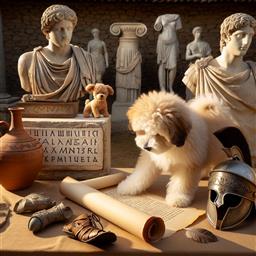4th Century Dog Names - Page 4
Updated: June 16, 2024
Welcome to a page that transports you back in time to the 4th century, where the art of naming dogs was as intriguing as the era itself. During this period, dogs were not just pets but were considered loyal companions, skilled hunters, and fierce protectors. As such, their names held a significant place in the society, reflecting the rich cultural and historic traditions of the time.
Our collection of names on this page is inspired from the fascinating period of the 4th century. These names, brimming with character and history, were common among the canines of the Roman, Byzantine, and other ancient civilizations. Each name tells a unique story, perhaps of bravery, loyalty, or a notable event of the era. So, whether you're a history buff, a dog lover, or a proud pet parent looking for a distinctive name for your furry friend, this page offers an exceptional selection that will transport you back in time.
In this carefully curated collection, you will find names that are not just historically significant but also carry a timeless charm. These names have stood the test of time and continue to hold their significance even today. So, delve into our unique collection and you might just find that perfect name that resonates with your pet's personality while honoring the rich history of the 4th century.
| Name | Reason to Choose |
|---|---|
| Odysseus | Named after the Greek hero, embodying the spirit of adventure |
| Olympius | Inspired by a 4th century Roman prefect |
| Ops | Honoring the Roman goddess of fertility and earth |
| Orpheus | Named after the legendary Greek musician, indicating the significance of music |
| Ovid | A tribute to the Roman poet who was widely read during the 4th century |
| Palladius | After a 4th century bishop |
| Pax | The Latin word for 'peace', a timeless wish for any pet |
| Pegasus | Named after the mythical Greek winged horse, representing the power of mythology |
| Pericles | Named after the Greek statesman, representing the politics of the time |
| Persius | A popular Roman poet whose work was admired during this period |
| Plato | Named after the famous Greek philosopher, reflecting the intellectual culture of the 4th century |
| Pluto | Nods to the Roman god of the underworld, perfect for a black dog |
| Poseidon | Named after the Greek god of the sea, indicating the importance of the sea |
| Priscus | This name is derived from Latin and means 'ancient', reflecting the 4th Century era |
| Prometheus | Named after the Greek Titan who gave fire to humanity, representing the value of knowledge |
| Ptolemy | Named after the Greek astronomer, symbolizing the exploration of the cosmos |
| Pulcher | It's Latin for 'beautiful', a popular descriptor for dogs then and now |
| Pythagoras | Named after the famous Greek mathematician, symbolizing the significance of learning |
| Quintus | A tribute to a name often used in Rome during the 4th century |
| Quirinus | Signifying 'spear', this name is drawn from Roman mythology |
| Rufus | A common Roman name, reflecting the naming conventions of the time |
| Salus | Latin for 'health', a timeless wish for any pet |
| Sappho | Named after the famous Greek poetess, representing the importance of literature |
| Saturn | A tribute to the Roman god of generation, dissolution, wealth, and liberation |
| Scipio | Named after the Roman general, representing the valor of the Roman military |
| Seneca | Named after the Roman Stoic philosopher, embodying the philosophical ideas of the time |
| Severus | Named after a 4th century Roman Emperor |
| Silvanus | A Roman god of forests, fitting for a nature-loving dog |
| Socrates | Named after the influential Greek philosopher, signifying the importance of philosophy |
| Sol | Latin for 'sun', a fitting name for a warm and radiant dog |
|
Suggest:
|
Submitted!
|
| 1 2 3 4 5 | |
Christian Inspired Names
| Name | Description |
|---|---|
| Ambrose | Named after Saint Ambrose, a famous bishop in the 4th century |
| Athanasius | Inspired by Saint Athanasius of Alexandria, a 4th-century bishop and theologian |
| Augustine | Inspired by Saint Augustine, a 4th century Christian theologian |
| Basil | Named after Saint Basil the Great, a bishop and theologian of the 4th century |
| Blaise | Inspired by Saint Blaise, a bishop and martyr of the 4th century |
| Cecilia | Saint Cecilia is venerated as a martyr and is considered the patron saint of musicians |
| Cyril | Derived from Saint Cyril of Jerusalem, a 4th-century bishop and Doctor of the Church |
| Damasus | Named after Pope Damasus I, a 4th-century pope |
| Ephrem | Named after Saint Ephrem the Syrian, a 4th-century deacon and hymnographer |
| Eusebius | Eusebius of Caesarea was a 4th-century bishop and historian |
| Eustochium | After Saint Eustochium, a disciple of Jerome and a desert ascetic |
| Gregory | Saint Gregory of Nazianzus was a 4th-century bishop and theologian |
| Hilary | Inspired by Saint Hilary of Poitiers, a bishop and theologian of the 4th century |
| Jerome | Named after Saint Jerome, who translated the Bible into Latin in the 4th century |
| Lucia | Saint Lucia was a 4th-century martyr and is venerated as a saint |
| Lucius | Inspired by the name of Pope Lucius I, who served in the 4th century |
| Macrina | Named after Saint Macrina the Elder, a prominent figure in the 4th-century Church |
| Marcellus | Inspired by Pope Marcellus I, who served in the 4th century |
| Martin | Inspired by Saint Martin of Tours, a prominent 4th-century bishop and saint |
| Melania | Named after Saint Melania the Elder, a 4th-century Christian saint |
| Monica | Comes from Saint Monica, the mother of Augustine, a significant figure in early Christianity |
| Optatus | Derived from Saint Optatus, a 4th-century bishop and theologian |
| Pachomius | Inspired by Saint Pachomius, a 4th-century monk and founder of coenobitic monasticism |
| Pamphilus | Derived from Saint Pamphilus of Caesarea, a 4th-century theologian and martyr |
| Paula | Saint Paula was a noblewoman who became a desert ascetic and supporter of Jerome |
|
Suggest:
|
Submitted!
|
Mythological Names
| Name | Description |
|---|---|
| Apollo | In Greek mythology, Apollo was the god of music, truth, and healing |
| Ares | Ancient Greeks worshipped Ares as the god of war |
| Artemis | Artemis was the Greek goddess of the hunt and wild animals |
| Athena | Athena was the Greek goddess of wisdom and warfare |
| Bacchus | Bacchus was the Roman god of wine, known for his wild and ecstatic festivals |
| Demeter | Demeter was the goddess of agriculture in Greek mythology |
| Dionysus | Dionysus was the Greek god of wine and celebration |
| Eros | Eros was the Greek god of love and sexual desire |
| Hades | Hades was the Greek god of the underworld |
| Hera | Hera was the queen of the gods in Greek mythology |
| Hercules | Hercules was a divine hero in Greek mythology known for his strength |
| Hermes | Hermes was a Greek deity known for his speed and cunning |
| Jupiter | Jupiter was the counterpart of Zeus in Roman mythology |
| Loki | Loki was a shape-shifting trickster in Norse mythology |
| Mars | Mars, in Roman mythology, was the god of war |
| Mercury | Mercury was the Roman god of financial gain, commerce, and communication |
| Neptune | Neptune was the Roman god of the sea |
| Nyx | Nyx was the Greek goddess of the night |
| Odin | Odin was a widely revered god in Norse mythology |
| Orion | Orion was a giant huntsman in Greek mythology |
| Perseus | Perseus was a legendary hero in Greek mythology |
| Poseidon | Poseidon was revered as the god of the sea in ancient Greek belief |
| Thor | Thor was the Norse god of thunder |
| Venus | Venus was the Roman goddess of love and beauty |
| Zeus | Zeus was the king of all gods in ancient Greek mythology |
|
Suggest:
|
Submitted!
|
Historical Figure Names
| Name | Description |
|---|---|
| Ambrose | From Saint Ambrose, one of the four original doctors of the Church |
| Arius | Inspired by Arius, a controversial Christian presbyter in Alexandria |
| Athanasius | Named after Athanasius of Alexandria, known for his work in Christian theology |
| Augustine | Derived from Augustine of Hippo, a renowned theologian and philosopher in the 4th century |
| Basil | Named after Saint Basil the Great, a bishop known for his influence on monasticism |
| Chrysostom | Reflects John Chrysostom, a notable Early Church Father |
| Constantine | This name was inspired by Constantine the Great, a Roman Emperor known for his significant contributions to Christianity |
| Cyril | Associated with Saint Cyril, who played a crucial role in the development of the Cyrillic script |
| Ephrem | Inspired by Ephrem the Syrian, a respected hymnographer and theologian |
| Epiphanius | Reflects Epiphanius of Salamis, a bishop known for his composition of an encyclopedia of heresies |
| Eusebius | Reflects Eusebius of Caesarea, a scholar known as the 'Father of Church History' |
| Gregory | Named after Gregory of Nazianzus, a 4th-century Archbishop renowned for his theological works |
| Hilarion | Named after Saint Hilarion, who was recognized for his ascetic life |
| Honorius | Inspired by Honorius, a Roman Emperor known for his defensive strategies |
| Jerome | Reflects Saint Jerome, famous for translating the Bible into Latin |
| Jovian | Reflects Jovian, a Roman Emperor who restored Christianity as the state religion |
| Julian | Named after Julian the Apostate, the last non-Christian ruler of the Roman Empire |
| Macarius | Reflects Macarius of Egypt, a renowned Christian monk |
| Martin | From Saint Martin of Tours, known for his role in the spread of Christianity in Gaul |
| Moses | Named after Moses the Black, a desert monk and influential leader of a monastic community |
| Pachomius | Inspired by Saint Pachomius, recognized for his contributions to Christian monasticism |
| Sylvester | From Pope Sylvester I, under whose authority the first Christian Roman basilicas were constructed |
| Theodosius | Named after Theodosius I, noted for making Christianity the state religion of the Roman empire |
| Valens | Inspired by Valens, a Roman Emperor remembered for his religious tolerance |
| Valentinian | Inspired by Valentinian I, a Roman Emperor known for his military prowess |
|
Suggest:
|
Submitted!
|
Greek Influenced Names
| Name | Description |
|---|---|
| Achilles | Inspired by the great Greek hero of the Trojan War |
| Apollo | Borrowed from the Greek god of music, truth and prophecy |
| Ares | An allusion to the Greek god of war |
| Artemis | An allusion to the Greek goddess of the hunt and wilderness |
| Athena | Derived from the Greek goddess of wisdom and warfare |
| Atlas | Inspired by the Titan who held up the celestial heavens |
| Demeter | Derived from the Greek goddess of the harvest |
| Dionysus | A tribute to the Greek god of wine and festivity |
| Eros | Named after the Greek god of love and passion |
| Hades | Named after the Greek god of the underworld |
| Helios | Echoes the Greek god who personified the sun |
| Hephaestus | Named after the Greek god of fire and metalworking |
| Hera | Influenced by the Greek goddess of marriage and family |
| Hercules | Derived from the Roman adaptation of the Greek divine hero Heracles |
| Hermes | Taken from the messenger of the Greek gods |
| Icarus | Inspired by the Greek myth of a boy who flew too close to the sun |
| Narcissus | Named after the figure from Greek mythology who fell in love with his own reflection |
| Nyx | Borrowed from the Greek goddess of the night |
| Odysseus | Taken from the legendary Greek king of Ithaca and the hero of Homer's epic poem the Odyssey |
| Orion | Named after a giant huntsman in Greek mythology |
| Pandora | Inspired by the first human woman created by the Greek gods |
| Perseus | Taken from a Greek hero who slew Medusa |
| Poseidon | Borrowed from the Greek god of the sea |
| Prometheus | Taken from the Titan who defied the gods by stealing fire and giving it to humanity |
| Zeus | Influenced by the Greek god of the sky and thunder |
|
Suggest:
|
Submitted!
|
Roman Influenced Names
| Name | Description |
|---|---|
| Apollo | Named after the Roman god of sun and light |
| Aquila | Latin for 'eagle', a prominent symbol in Roman culture |
| Augustus | Named after the first Roman Emperor, a significant figure in 4th-century Roman history |
| Cassius | Derived from an influential Roman family's name |
| Cicero | Taken from a famous Roman philosopher and statesman |
| Claudius | Named after a Roman Emperor, whose influence was felt even in the 4th century |
| Drusus | Inspired by a Roman military commander's name |
| Felix | Latin for 'fortunate', a popular name in the 4th century |
| Flavius | Named after a prominent political family in ancient Rome |
| Hadrian | Named after a Roman Emperor known for his architectural contributions |
| Lucius | Derived from a common Roman personal name |
| Mars | Inspired by the Roman god of war, a powerful figure in mythology |
| Maximus | Influenced by a popular Roman general's name in the 4th century |
| Octavian | Taken from the name of Augustus before he became emperor |
| Remus | Inspired by one of the legendary founders of Rome |
| Silvanus | Named after the Roman god of woods and fields |
| Tacitus | Taken from a famous Roman historian's name |
| Ulysses | The Latin form of 'Odysseus', a hero from Roman and Greek mythology |
| Valor | Inspired by the Roman virtue of bravery and courage in battle |
| Veritas | Derived from the Roman goddess of truth, a philosophical concept held in high esteem |
| Vesta | Inspired by the Roman goddess of home and hearth, a symbol of domestic life |
| Virgil | Inspired by a famous Roman poet |
| Vitus | Derived from the name of a Christian saint in the 4th century |
| Xerxes | Taken from the name of a famous Persian king, known to the Romans |
| Zenon | Inspired by a philosopher's name, popular in the Roman period |
|
Suggest:
|
Submitted!
|
User Submitted Images
There are currently no user submitted images for this page. This is your opportunity to be the first! Submit your photo below.
User Recommendations
There are currently no name recommendations for this page. This is your opportunity to be the first! Make your recommendation below.
Recently Updated
We would like to take this time to thank all of our visitors that make DogNamed.com the best dog naming resource on the web. Our site would not be where it is today without your suggestions, ratings, and photo submissions. So pat yourselves on the back for a job well done and keep up the good work! If you have any comments, suggestions, or ideas for the this page or any part of our site, don't hesitate to drop us a line on our Contact Page. Thank you! -The DogNamed Team




























